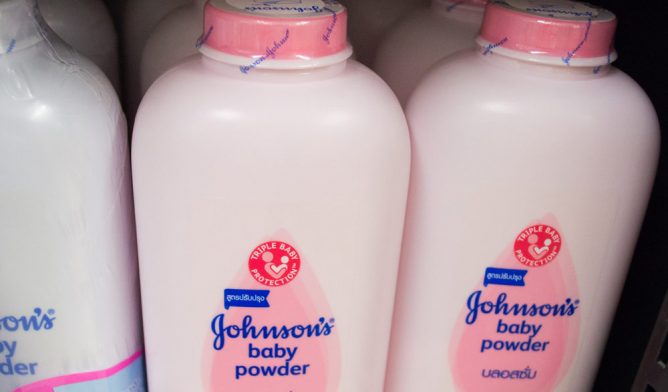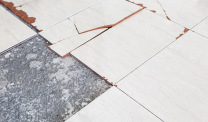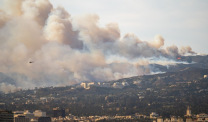Johnson & Johnson Knew of Asbestos in Baby Powder for Decades
Asbestos Exposure & BansWritten by Tim Povtak | Edited By Walter Pacheco

Investors responded negatively to an extensive report Friday that Johnson & Johnson knew for decades that its iconic baby powder could be contaminated with toxic asbestos but failed to warn the public or inform regulators.
Shares of Johnson & Johnson stock dropped by 10 percent Friday, its worst loss in almost two decades, dealing the company a serious financial setback.
Reuters News Service detailed internal documents, company memos and extensive conversations that contradicted previous claims by Johnson & Johnson that its Shower to Shower and Baby Powder products were beyond reproach.
Johnson & Johnson already is facing more than 11,000 plaintiffs contending its baby powder was causing cancer. Most of the cases involve ovarian cancer, but a small percentage relate to mesothelioma cancer, which is caused almost exclusively by asbestos.
Wave of Lawsuits Against J&J Expected in 2019
In court proceedings, J&J has filed thousands of documents in various trials, but most were deemed confidential and unavailable to the public.
The Reuters report included the most comprehensive, damaging collection of data to date, including trial reports, courtroom testimonies and previously unavailable documents.
An even bigger wave of lawsuits is expected in 2019 stemming from the report.
Talc, the softest naturally occurring mineral in the world, is used in a variety of consumer and industrial products, including Johnson & Johnson Baby Powder. When mined, talc often is found close to asbestos, which can cause cross contamination.
Internal documents that Reuters reviewed included efforts by Johnson & Johnson to influence scientific research on the health effects of talc and hinder regulators to limit asbestos in talc products.

If you think you were exposed to asbestos using talc, we can help match you with an attorney. Get the compensation you deserve.
Get Help NowTalc Added $420B to J&J’s Revenue
J&J, which is based in Brunswick, New Jersey, is the world’s largest marketer of talc products. Its sales, according to Reuters, outpace those of all competitors combined.
According to Johnson & Johnson’s latest stockholder report, talc contributed to just $420 million of the company’s $76 billion in revenue for 2017.
According to the company’s latest quarterly report, the talc cases amount to 10 percent of all its pending personal injury lawsuits.
Until now, results from lawsuits earlier this year — which have been mixed — had not dampened Johnson & Johnson’s standing in the financial world.
Until Friday, the stock price had risen 6 percent for 2018, ahead of the Dow Jones Industrial Average.
J&J Talc-Related Cases in 2018
Some highly publicized J&J cases this year include:
- In April, a jury in New Jersey ordered Johnson & Johnson to pay $25.9 million to Stephen Lanzo III and his wife, believing his mesothelioma cancer was caused by the baby powder. It was the first time Johnson & Johnson had lost an asbestos-related talcum powder lawsuit.
- In May, a jury in Los Angeles awarded $25.7 million in damages to Joanne Anderson, who claimed that the asbestos in her baby powder led to a diagnosis of mesothelioma.
- Also in May, a South Carolina judge declared a mistrial after jurors failed to reach a verdict for a man alleging that asbestos in Johnson & Johnson Baby Powder caused the mesothelioma that led to his wife’s death.
- In July, a jury in St. Louis ordered Johnson & Johnson to pay $4.9 billion in damages to 22 women who blamed the baby powder for causing ovarian cancer. It was the sixth largest product-defect verdict in U.S. history.
- In September, a jury in California was deadlocked and a mistrial was declared in a case involving school counselor Carolyn Weirick, who believed the baby power caused her mesothelioma. She was asking for $25 million in damages.
Through each trial, Johnson & Johnson executives have maintained that their products do not contain toxic asbestos.
“This is all a calculated attempt to distract from the fact that thousands of independent tests prove our talc does not contain asbestos or cause cancer,” Ernie Knewitz, vice-president of global media relations at Johnson & Johnson, told Reuters. “Any suggestion that Johnson & Johnson knew, or hid, information about safety of talc is false.”






